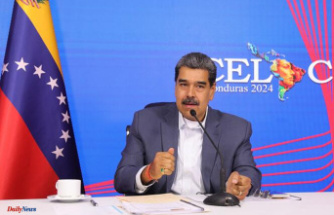EnBW has been organizing the end of the nuclear age for years. Now the consequences of the Russian war of aggression in Ukraine are thwarting her plans - and not only with regard to the operation of the reactors.
Philippsburg/Neckarwestheim (dpa/lsw) - The extended term for the Neckarwestheim II nuclear power plant is significantly delaying the dismantling plans of the operator EnBW. It is about more than the three and a half months that the reactor in the Heilbronn district is to remain connected to the grid, said the managing director of the nuclear power division, Jörg Michels, on Monday in Philippsburg. The delay is expected to be several months, possibly even well over a year, he said. EnBW is trying to dismantle its piles within 10 to 15 years.
She plans about ten years in advance, said Michels. The group commissions companies that provide personnel and equipment, for example, make contracts and agree on appointment windows. All of this is now being reorganized step by step. However, the companies are also working for other customers - also abroad and also with running kilns - so that agreed dates cannot simply be postponed by three and a half months. Running costs of more than one million euros were incurred every month in operation.
Continued operation and rescheduling led to enormous effort, said Michels. But: "It's not about economic aspects. It's about security of supply, about network stability."
It was actually planned that Neckarwestheim II and Isar 2 in Bavaria and the Emsland kiln in Lower Saxony, as the last three nuclear power plants still in operation in Germany, would go offline at the end of the year. In order to secure the energy supply in Germany as a result of Russia's war of aggression in Ukraine, they should now remain connected to the grid and produce electricity by mid-April 2023 at the latest.
Block II in Neckarwestheim will be shut down on December 31 and then stand still for two to three weeks. During this time, around 200 fuel elements will be reassembled. This should ensure electricity production of up to 1.7 billion kilowatt hours after the restart by mid-April. Without the new configuration, only about a third of that would be possible, Michels clarified.
Electricity production in Block I had already ended in 2011 after the federal government had decided to phase out nuclear power in Germany as a result of the Fukushima nuclear disaster. It went into operation in 1976. Block II went online 13 years later.
Michels made it clear that in order to be able to operate Neckarwestheim II beyond April 15, the plans would have to be approved by politicians now. New fuel elements would then have to be procured, a major overhaul of the power plant would be necessary and staff would have to be trained. You can't just say next year that the nuclear lifespan will be extended again, emphasized Michels. "It's illusory. It doesn't work that way." The FDP in particular has repeatedly questioned the nuclear phase-out in the spring.












